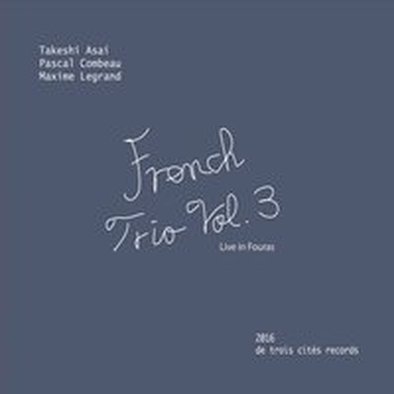
It doesn’t stop there with Takeshi. Not at all. He has an astonishing capacity to envelop and enrapture an audience so that they, too, become part of the experience and add their own chemistry to that of the artists.
So it is with the magic of Takeshi’s captured live performances and this album is an extraordinary example of that most endearing and captivating of Jazz environments, the live trio.
It is the third recording of the wonderful French Trio of Takeshi on piano, Pascal Combeau on bass, and Maxime Legrand on drums.
When asked why the July 11 concert was chosen among the other summer concerts of the Trio, Takeshi answered, “The French Trio had an honor to give seven concerts this summer. Most of them went exceptionally well thanks to the great French audience, which has supported the trio for the last four years. But, this concert was particularly great… The audience had brought the greatest energy which I felt while I played. We had better pianos and better sound conditions on other dates, but I have chosen this concert because of the energy and the spirit, and the communication between the trio and the audience that we had on that night. It was the night that I felt so fortunate to play with such great musicians and friends, Maxime Legrand and Pascal Combeau.”
But not only the artists and the audience, the depth and power, the emotion and the life, indeed the love within the compositions themselves, contribute to the profundity of the exquisite experience.
The concert that night opened with Moonlit Night. It was a composition that Takeshi had played on 2016’s Takeshi Asai Solo: Live in New York. It is a lovely nocturne that was touching as a solo piano piece but receives a deeper coloring with the touches of Combeau and Legrand. Written in 1999, while Takeshi was at Berklee School of Music, he says, “I wanted to render a magical power that the moon has on us.”
Eb+ was written in April of 2016. The title is the musical designation of the E-flat augmented chord. With its advanced rhythmic and harmonic features, it still has the power to charm and to touch. The point of the song, according to Takeshi, was “to reduce the literature aspect in the song,” leaving it as “pure music, which leaves for the imagination of the audience.” The simplicity of the approach creates a heart-warming aspect that is not lost on the artists who render it emotionally and with their own warmth.
Combeau adds a vibrato to his bass that reaches right inside the heart and squeezes.
Tell Me There’ll Be Better Days is a Pascal Combeau piece written for his son. It opens with a melancholic Latin approach that Takeshi says is suitable for the bandoneon “which is very French.” The movement of the piece is energetic, audible through the solos and trio. Even in the restrained moments, a life pulses throughout the performance. Accompanying that life, as always, is a hope.
ABC was inspired by Imogen Heap’s Speeding Cars. “It’s in the ABC of growing up.” The piece originally was written for the New York Trio in 2012. Takeshi knew that it would fit well with the French Trio and, so, has recorded it a second time to great effect.
It is slow and reflective, giving time to pause and consider. Combeau and Legrand pick up precisely on what Takeshi hopes to accomplish in the piece, adding their own stories and experiences to Takeshi’s narrative. It becomes a concurrent but thrice-told tale of learning and wonder.
Takeshi wrote When You Feel Sad before leaving for the French tour. Simply put, this is the song to cheer you when you feel sad. Takeshi describes it with “the melody is easy and the harmony is easy, but the rhythm is not. It features an odd meter 3+3+2.” That little complexity is enough to bring a smile to your face. The effect of the simple melody against the odd time is captivating.
When asked why he chose the Miles Davis piece Nardis, Takeshi replied with “It was my favorite piece when I was a beginning jazz student. Then, I forgot it for over 20 years. When I gave a concert in Paris, someone in my Paris band called the piece and we played. It was like a meeting your old girlfriend after 20 years of separation. Then, I proposed the piece to the French Trio. We have never talked about how we play, but we were in sync, amazingly. It’s common knowledge that it was written by Miles Davis, but my hunch is always telling me that it was written by Bill Evans. Or, at least both wrote it. As a life-long pupil of Bill Evans, playing this song in France gave me a great pleasure and gracefulness to my hero. Musically speaking, the first two chords, Phrisian (E minor to F major gives) is one of my favorite modal harmonies.”
Another song written just before his latest French sojourn was Very Little Waltz. The melody and the changes “came together as a package in a lightning bolt.” As such, Takeshi never edited the piece. “I just traced the sound I heard in my head.” Truth be told, Very Little Waltz is a prequel to (Not So) Little Waltz from New York Trio, Vol. 1.
Macka is Takeshi’s turn at writing something “stupid and funny and blunt.” Even after the great performances of Combeau and Legrand, Takeshi stills feels he achieved his aim. For the audience, nothing could be further from the truth.
French Trio Vols. 1 and 2 were heralds that prepared us for the coming of something magnificent. French Trio, Vol. 3 is the crowning achievement.
~Travis Rogers, Jr. The Jazz Owl
 RSS Feed
RSS Feed
